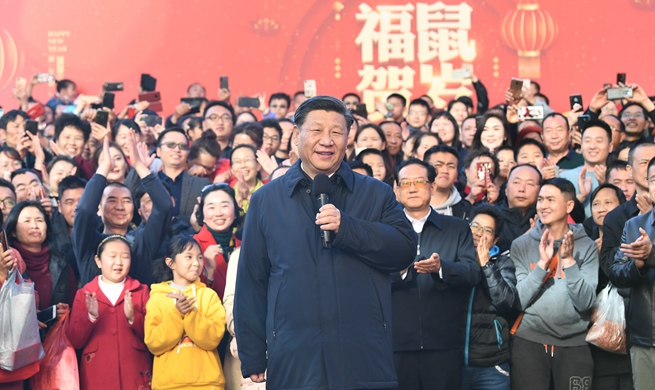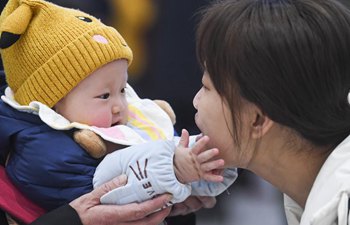SEOUL, Jan. 22 (Xinhua) -- South Korea's biggest automaker Hyundai Motor posted its biggest revenue last year on an enhanced product mix and a positive currency effect, the company said on Wednesday.
Hyundai's revenue gained 9.3 percent over the year to 105.79 trillion won (90.8 billion U.S. dollars) in 2019, topping the 100 trillion-won mark for the first time in the company's history.
Operating profit surged 52 percent to 3.68 trillion won (3.2 billion U.S. dollars), and net income almost doubled to 3.26 trillion won (2.8 billion U.S. dollars) in 2019 from 1.65 trillion won (1.4 billion U.S. dollars) in the previous year.
The robust earnings were attributed to the strengthened product mix with an increased sale of sport utility vehicles (SUV), such as Palisade, and all-new Grandeur sedan that offset the decline in overall sales volume.
The domestic currency's depreciation versus the U.S. dollar lifted the conversion value of overseas vehicle sales. The won/dollar exchange rate averaged 1,166 won per dollar last year, up 6 percent from a year earlier.
The South Korean carmaker sold a total of 4,425,528 vehicles globally in 2019, down 3.6 percent from the prior year.
In the domestic market, automobile sale added 2.9 percent to 741,842 units, but overseas sale declined 4.8 percent to 3,683,686 units.
Auto sale in China tumbled 17.7 percent in 2019 from the prior year, with those in India, Latin America and Europe sliding 7.2 percent, 5.1 percent and 1.5 percent each.
Car sales in North America and Russia increased 1.0 percent and 3.6 percent respectively.
Hyundai said in a statement that the company targeted this year's annual vehicle sales at 4,576,000 units, including 732,000 units in South Korea and 3,844,000 units across the rest of the world.
It also aimed to achieve a 5-percent operating profit margin this year with the improved product mix of new models such as Avante and Tucson SUV as well as Genesis luxury brand's GV80 SUV.
Hyundai's operating profit margin was 3.5 percent in 2019, up 1 percentage point from the previous year.
During the October-December quarter, the company's revenue came in at 27.87 trillion won (23.9 billion U.S. dollars), up 10.5 percent from a year earlier.
Operating profit more than doubled to 1.24 trillion won (1.1 billion U.S. dollars) in the December quarter from 501.1 billion won (430.1 million U.S. dollars) a year earlier.
Operating profit margin advanced 2.5 percentage points from a year earlier to 4.5 percent in the fourth quarter.
Hyundai recorded a net income of 851.2 billion won (730.6 million U.S. dollars) in the fourth quarter, turning around from a net loss of 203.3 billion won (174.5 million U.S. dollars) a year earlier.
The favorable currency effect and the company's cost-reduction efforts contributed to the increased fourth-quarter earnings, offsetting a fall in overall vehicle sales.
Hyundai sold 1,195,859 vehicles across the world in the fourth quarter, down 2.5 percent from a year earlier. It was mainly attributed to sluggish demand in China and India.
Hyundai's local car sale inched down 0.4 percent over the year to 194,407 units in the fourth quarter, while overseas sale diminished 2.9 percent to 1,001,452 units.
The company said it will strive for balance between an investment for future growth and an increase of shareholder value with improved profitability.
It planned to maintain its 2019 year-end divided at 3,000 won (2.6 U.S. dollars) per share, the same level as in 2018.













